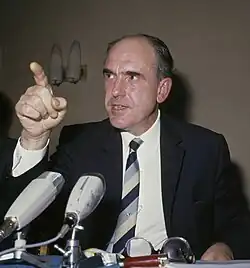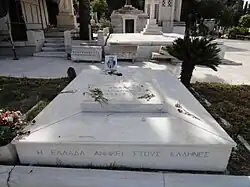Andreas Papandreou


Andreas Georgios Papandreou (5 February 1919 – 23 June 1996) was a Greek economist, politician and a dominant figure in Greek politics, son of Georgios Papandreou, and known for founding the Panhellenic Socialist Movement (PASOK) political party, which he led from 1974 to 1996. He served three terms as prime minister of Greece.
Quotes
- National Independence, Popular Sovereignty, Social Liberation, Democratic Process.
- Main slogan of the Panhellenic Liberation Movement during the Greek junta years.
- Time for "Change" has come.
- Before the elections of 1981.
- There are no institutions – only the people rule this country.
- Papandreou during a broadly televised party rally.
- Pappas, Takis S.; Aslanidis, Paris (2015). "Greek populism: A political drama in five acts". in Kriesi, Hanspeter; Pappas, Takis S.. European populism in the shadow of the great recession. ECPR Press. pp. 184-185. ISBN 9781785521386.
- Greece belongs to the Greeks.("Η Ελλάδα ανήκει στους 'Ελληνες.")
- His main motto since his entry into Greek politics, which was in contrast to Konstantinos Karamanlis' quote: "Greece belongs to the West."
- Draenos, Stan (2012) (in en). Andreas Papandreou: The Making of a Greek Democrat and Political Maverick. New York: I. B. Tauris. p. 195. ISBN 978-1780760803.
- We consume more than we produce.
- By the end of his first administration (1985), Papandreou cautioned his colleagues at PASOK regarding the state of the Greek economy after implementing his policies.
- Koliopoulos, John S.; Veremis, Thanos M. (2009) (in en). Modern Greece A History Since 1821. Oxford: Wiley-Blackwell. p. 165. ISBN 9781444314830.
- Greece is rich but the Greeks are poor.
- Clogg, Richard (2013) (in en). A Concise History of Greece. Cambridge: Cambridge University Press. p. 239. ISBN 9781107656444.
- I accuse my accusers.
- Papandreou shouted as he stormed out of the Greek Parliament Hall, and the vote to indict him for the Koskotas scandal was about to begin.
- "Papandreou Trial a Modern Drama". Chicago Tribune. 5 October 1989.
- The Greeks have betrayed me.
- Papandreou in Stockholm after his release from the junta regime at the end of 1967. Soon, he concentrated his conspiratorial rhetoric against the United States.
- Stearns, Monteagle (2021) (in en). The enigma of Andreas Papandreou. Sterling: Potomac Books. p. 85. ISBN 978-1640123298.
- Tsovola give it [to them] all. (Τσοβόλα δώσ'τα όλα.)
- As the scandals and elections of 1989 were closing in, Papandreou's populism reached new heights by giving a public command in front of crowd to Minister of Finise Dimitris Tsovolas to empty the state coffers. The crowd chanted this back. Later on, Papandreou said he was merely joking.
- Pappas, Takis S. (2019) (in en). Populism and liberal democracy: A comparative and theoretical analysis. Oxford: Oxford University Press. p. 247. ISBN 9780192574893.
- Power to the people.
- In Papandreou's populist language, it meant Power to PASOK since PASOK is the people.
- Pappas, Takis S. (1998) (in en). Making Party Democracy in Greece. London: Palgrave Macmillan UK. p. 158. ISBN 9780333983614.
- I'm grateful to no one about anything.
- Papandreou responding if he felt any gratitude toward America for keeping Greece out of the Eastern Bloc in the 1940s to former CBS "60 Minutes" correspondent Diane Sawyer.
- Kaplan, Robert D. (1994) (in en). Balkan Ghosts, A Journey Through History. London: Vintage Books. p. 270. ISBN 0679749810.
- I no longer trust anyone, not even myself.
- Papandreou speaking to his son, George Papandreou, in 1987.
- Featherstone, Kevin; Papadimitriou, Dimitris (2015) (in en). Prime Ministers in Greece, The Paradox of Power. Oxford: Oxford University Press. p. 114. ISBN 978-0198717171.
- Don't worry, I’ll stop the audit. As long as I'm prime minister, nothing's going to happen.
- According to Koskotas claiming of having recorded this: Papandreou responding to George Koskotas' fears that a possible audit could unravel the financial improprieties in the Bank of Crete as it was revealed in the Koskotas scandal.
- Doyle McManus (16 April 1989). "Koskotas Implicates Premier in Payoffs, Bribery: Ex-Banker's Tale May Be Greek Tragedy". Los Angeles Times.
- It might be expected that an official would offer himself a present, but not one as big as 500 million drachmas.
- Papandreou commenting on the Electric Power Authority Scandal in 1985.
- Bull, Martin J.; Newell, James L., eds (2003). Corruption in Contemporary Politics. New York: Pulgrave Mcmillan. p. 36.
- Simitis is good, but he is not PASOK.
- In 1979, Andreas Papandreou commented about Costas Simitis's capabilities but also wanted to keep him at a distance from Papandreou's party.
- Featherstone, Kevin; Papadimitriou, Dimitris (2015) (in en). Prime Ministers in Greece, The Paradox of Power. Oxford: Oxford University Press. p. 143. ISBN 978-0198717171.
Quotes about
- Greece's only successful fascist regime probably was Andreas Papandreou's [...] Both the military regime of John Metaxas, from 1936 to 1941, and the junta from 1967 to 1974, never achieved a broad level of popular response to their message, which was seen as artificial, even ridiculous. By contrast, Papandreou's posturings and habits reassured a people who harbored a mistrust and envy of the West that their way of life was legitimate. Much like Mussolini, Papandreou succeeded as the embodiment of a nationalist-populist resentment. He was the ideal Greek every-man. He threatened America and backed up these threats by embracing America's enemies—Qaddafi and the terrorists. Papandreou danced the traditional Greek dances in public. He distributed the wealth to his partisans as a reward for their loyalty. Even with the Liani affair, in a male-oriented society like Greece's there was a certain resonance. Papandreou projected the Mussoliniesque image of the nation's first lover. His divorce and humiliation of Margaret Chant not only reinforced his (and Greece's) break with America, but also with another threatening demon of the Greek male, feminism.
- Analysis of the Greek-American scholar and publisher Aristide Caratzas in 1990.
- Kaplan, Robert D. (1994) (in en). Balkan Ghosts, A Journey Through History. London: Vintage Books. pp. 275-276. ISBN 0679749810.
- He [Andreas Papandreou] wanted to build a state with better salaries and services. But in the end, the money just went into the bureaucracy and not to the people. In fact, we built up such a large state that we had to keep borrowing just to pay its expenses. This was a terrible mistake.
- Theodore Stathis, who worked in the governments of Andreas Papandreou and of his father, commented on Andreas Papandreou's vision.
- Landon Thomas Jr. (12 July 2011). "Family Differences, Global Issues". New York Times.
- Andreas Papandreou corrupted the Greek psyche and gave to Greeks an entitlement culture based on their existence and not on their ability to work and take risks.
- Jason Manolopoulos, a hedge fund manager and author of a book on Greece’s economic collapse.
- Landon Thomas Jr. (12 July 2011). "Family Differences, Global Issues". New York Times.
- One of the most courageous and committed politicians I have ever met.
- Melina Merkouri describing Papandreou.
- Gage, Nicholas (March 21, 1982). "The paradoxical Papandreou". The New York Times Magazine.
- Andreas is an actor who does not believe in anything. He loves himself, power and women, and that's all.
- Demosthenes Botsaris, a former political ally of Papandreou.
- Gage, Nicholas (March 21, 1982). "The paradoxical Papandreou". The New York Times Magazine.
- He's an unpredictable, very irresponsible man, ruthlessly ambitious, Andreas has to be Prime Minister of the world to be happy. But he has always had very generous feelings toward the Greek people.
- Papandreou's first wife (Christina Rassia) after divorce.
- Gage, Nicholas (March 21, 1982). "The paradoxical Papandreou". The New York Times Magazine.
- Andreas was not a philanderer. He was a serial monogamist.
- Papandreou's second wife, Margaret Chant-Papandreou, talking about Papandreou to US Ambassador Monteagle Stearns after Papandreou's third marriage.
- Pavlos Papadopoulos (5 April 2021). Kathimereini.
- Stearns, Monteagle (2021) (in en). The enigma of Andreas Papandreou. Sterling: Potomac Books. p. 66. ISBN 978-1640123298.
- There are many scandals in Greece [...] The only difference in my case is that here someone is saying, himself, what he did with Papandreou.
- George Koskotas while in jail implicating Andreas Papandreou in the Koskotas scandal.
- Doyle McManus (16 April 1989). "Koskotas Implicates Premier in Payoffs, Bribery: Ex-Banker's Tale May Be Greek Tragedy". Los Angeles Times.
External links
 Encyclopedic article on Andreas Papandreou on Wikipedia
Encyclopedic article on Andreas Papandreou on Wikipedia Media related to Andreas Papandreou on Wikimedia Commons
Media related to Andreas Papandreou on Wikimedia Commons